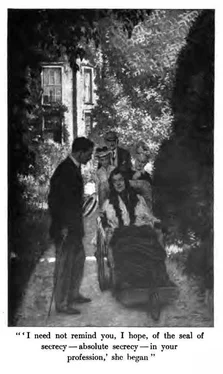"But you didn't own him at the date of his death."
"That wouldn't keep me away. Only, they made such a fuss about the watching"—she caught her breath—"it might be ostentatious from that point of view, too. Oh, George"—she reached for his hand—"we're two little orphans moving in worlds not realized, and we shall make some bad breaks. But we're going to have the time of our lives."
"We'll run up to London to–morrow, and see if we can hurry those English law solicitors. I want to get to work."
They went. They suffered many things ere they returned across the fields in a fly one Saturday night, nursing a two by two–and–a–half box of deeds and maps—lawful owners of Friars Pardon and the five decayed farms therewith.
"I do most sincerely 'ope and trust you'll be 'appy, Madam," Mrs. Cloke gasped, when she was told the news by the kitchen fire.
"Goodness! It isn't a marriage!" Sophie exclaimed, a little awed; for to them the joke, which to an American means work, was only just beginning.
"If it's took in a proper spirit"—Mrs. Cloke's eye turned toward her oven.
"Send and have that mended to–morrow," Sophie whispered.
"We couldn't 'elp noticing," said Cloke slowly, "from the times you walked there, that you an' your lady was drawn to it, but—but I don't know as we ever precisely thought—" His wife's glance checked him.
"That we were that sort of people," said George. "We aren't sure of it ourselves yet."
"Perhaps," said Cloke, rubbing his knees, "just for the sake of saying something, perhaps you'll park it?"
"What's that?" said George.
"Turn it all into a fine park like Violet Hill"—he jerked a thumb to westward—"that Mr. Sangres bought. It was four farms, and Mr. Sangres made a fine park of them, with a herd of faller deer."
"Then it wouldn't be Friars Pardon," said Sophie. "Would it?"
"I don't know as I've ever heard Pardons was ever anything but wheat an' wool. Only some gentlemen say that parks are less trouble than tenants." He laughed nervously. "But the gentry, o' course, they keep on pretty much as they was used to."
"I see," said Sophie. "How did Mr. Sangres make his money?"
"I never rightly heard. It was pepper an' spices, or it may ha' been gloves. No. Gloves was Sir Reginald Liss at Marley End. Spices was Mr. Sangres. He's a Brazilian gentleman—very sunburnt like."
"Be sure o' one thing. You won't 'ave any trouble," said Mrs. Cloke, just before they went to bed.
Now the news of the purchase was told to Mr. and Mrs. Cloke alone at 8 P.M. of a Saturday. None left the farm till they set out for church next morning. Yet when they reached the church and were about to slip aside into their usual seats, a little beyond the font, where they could see the red–furred tails of the bellropes waggle and twist at ringing time, they were swept forward irresistibly, a Cloke on either flank (and yet they had not walked with the Clokes), upon the ever–retiring bosom of a black–gowned verger, who ushered them into a room of a pew at the head of the left aisle, under the pulpit.
"This," he sighed reproachfully, "is the Pardons' Pew," and shut them in.
They could see little more than the choir boys in the chancel, but to the roots of the hair of their necks they felt the congregation behind mercilessly devouring them by look.
"When the wicked man turneth away." The strong, alien voice of the priest vibrated under the hammer–beam roof, and a loneliness unfelt before swamped their hearts, as they searched for places in the unfamiliar Church of England service. The Lord's Prayer "Our Father, which art"—set the seal on that desolation. Sophie found herself thinking how in other lands their purchase would long ere this have been discussed from every point of view in a dozen prints, forgetting that George for months had not been allowed to glance at those black and bellowing head–lines. Here was nothing but silence—not even hostility! The game was up to them; the other players hid their cards and waited. Suspense, she felt, was in the air, and when her sight cleared, saw, indeed, a mural tablet of a footless bird brooding upon the carven motto, "Wayte awhyle—wayte awhyle."
At the Litany George had trouble with an unstable hassock, and drew the slip of carpet under the pewseat. Sophie pushed her end back also, and shut her eyes against a burning that felt like tears. When she opened them she was looking at her mother's maiden name, fairly carved on a blue flagstone on the pew floor: Ellen Lashmar. ob. 1796. aetat 27.
She nudged George and pointed. Sheltered, as they kneeled, they looked for more knowledge, but the rest of the slab was blank.
"Ever hear of her?" he whispered.
"Never knew any of us came from here."
"Coincidence?"
"Perhaps. But it makes me feel better," and she smiled and winked away a tear on her lashes, and took his hand while they prayed for "all women labouring of child"—not "in the perils of childbirth"; and the sparrows who had found their way through the guards behind the glass windows chirped above the faded gilt and alabaster family tree of the Conants.
The baronet's pew was on the right of the aisle. After service its inhabitants moved forth without haste, but so as to block effectively a dusky person with a large family who champed in their rear.
"Spices, I think," said Sophie, deeply delighted as the Sangres closed up after the Conants. "Let 'em get away, George."
But when they came out many folk whose eyes were one still lingered by the lychgate.
"I want to see if any more Lashmars are buried here," said Sophie.
"Not now. This seems to be show day. Come home quickly," he replied.
A group of families, the Clokes a little apart, opened to let them through. The men saluted with jerky nods, the women with remnants of a curtsey. Only Iggulden's son, his mother on his arm, lifted his hat as Sophie passed.
"Your people," said the clear voice of Lady Conant in her ear.
"I suppose so," said Sophie, blushing, for they were within two yards of her; but it was not a question.
"Then that child looks as if it were coming down with mumps. You ought to tell the mother she shouldn't have brought it to church."
"I can't leave 'er behind, my lady," the woman said. "She'd set the 'ouse afire in a minute, she's that forward with the matches. Ain't you, Maudie dear?"
"Has Dr. Dallas seen her?"
"Not yet, my lady."
"He must. You can't get away, of course. M–m! My idiotic maid is coming in for her teeth to–morrow at twelve. She shall pick her up—at Gale Anstey, isn't it?—at eleven."
"Yes. Thank you very much, my lady."
"I oughtn't to have done it," said Lady Conant apologetically, "but there has been no one at Pardons for so long that you'll forgive my poaching. Now, can't you lunch with us? The vicar usually comes too. I don't use the horses on a Sunday"—she glanced at the Brazilian's silver–plated chariot. "It's only a mile across the fields."
"You—you're very kind," said Sophie, hating herself because her lip trembled.
"My dear," the compelling tone dropped to a soothing gurgle, "d'you suppose I don't know how it feels to come to a strange county—country I should say—away from one's own people? When I first left the Shires—I'm Shropshire, you know—I cried for a day and a night. But fretting doesn't make loneliness any better. Oh, here's Dora. She did sprain her leg that day."
"I'm as lame as a tree still," said the tall maiden frankly. "You ought to go out with the otter–hounds, Mrs. Chapin. I believe they're drawing your water next week."
Sir Walter had already led off George, and the vicar came up on the other side of Sophie. There was no escaping the swift procession or the leisurely lunch, where talk came and went in low–voiced eddies that had the village for their centre. Sophie heard the vicar and Sir Walter address her husband lightly as Chapin! (She also remembered many women known in a previous life who habitually addressed their husbands as Mr. Such–an–one.) After lunch Lady Conant talked to her explicitly of maternity as that is achieved in cottages and farm–houses remote from aid, and of the duty thereto of the mistress of Pardons.
Читать дальше












